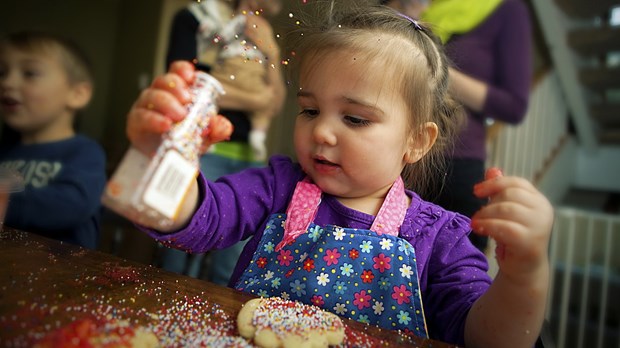Don't Cry Over Spilled Soap

It was a scene that many mothers can relate to. I was tired. She was tired. It was naptime and things were taking longer than I felt they should. I opened the bathroom door to find liquid hand soap dripping down the vanity. My five-year-old’s hands were glistening and slippery from an excessive amount of soap. Suddenly my mind flashed back to a few recent incidents when I had found the soap dispenser open and lying on its side on the sink.
Before reacting, I took a deep breath and asked, “What’s going on? Why is the lid off?” Maybe the pump was broken. Maybe that was the only way she could wash her hands.
Then my sweet girl looked up at me, her blue eyes large and watching for my reaction, “Because I wanted to.”
She understood the error of her ways. She knew she shouldn’t have made the mess. It could’ve ended there. And it should have. But instead, I was tired. I was short. I raised my voice. I reprimanded her. I barked. She cried.
Even When . . .
We have all experienced these less-than-ideal moments in parenting when we fall short, when we miss the mark, when we overreact. The good news is that we don’t have to stay in these moments. We can move beyond them and good can actually come from them because those are also the times that can turn into teachable moments—not just for them, but also for us.
As parents, we are our children’s greatest reflection of God and of his love for us. They learn how to pursue God by watching us and what we need to model for them is grace, forgiveness, humility, and reconciliation. We are called to show God’s love even when we’re tired. Even when we’re spent. Even when we just desperately want to curl up and take a nap.
As Christian parents, we are called to train our children in faith (). That means teaching forgiveness and reconciliation through leading by example. That means humbling ourselves and asking for their forgiveness when we mess up. Sure it would be easy to brush off an incident, such as the soap mishap. In the grand scheme of things, did it really matter? Will she even remember it in a week or a month or a few years down the road? Probably not, but what impact and impression would it make on her growing mind, heart, and faith if, instead of brushing it off and going about the rest of the day, I stopped and apologized?
Small (Big) Matters
Often we think of reconciliation in grand terms of an estranged and difficult relationship or situation. But we need to seek reconciliation even in small matters because moments that seem small can create wounds with the potential to fester over time. We need to set aside our pride and teach forgiveness. We need to show our children that we sometimes stumble and that we are not perfect.
That’s where humility comes in. We often ask our children to apologize for a misdeed. We require them to step up, to humble themselves, and to ask for forgiveness—and we need to require the same thing of ourselves. For children to understand the process, they need to see it modeled. Let’s face it; no parent is perfect. No parent gets everything right. All of us have had plenty of opportunities to put aside pride and apologize to our children.
Ephesians 4:26 is often viewed as a key principle for marriage; it says, “‘In your anger do not sin’: Do not let the sun go down while you are still angry” (NIV). But if this principle of reconciliation holds true for a marriage relationship, why not apply it also to parenting? We sometimes have a double standard when it comes to adult-child relationships as opposed to adult-adult relationships. If we wronged our spouse, we know the importance of asking forgiveness. Similarly, we need to remember that while we are the authority figures and disciplinarians of our children, we are also responsible for our own actions and reactions toward them. When we mess up, we must apologize just as we would with our spouse.
Real Reconciliation
As we raise our children to know Christ, his love, his forgiveness, and his grace, we must model the actions we expect from them. If we want them to practice and seek forgiveness in their own lives, then we must teach them how. By doing so, we show them that there is a right and a wrong, that we all sin and , and that everyone needs forgiveness.
But these moments shouldn’t merely be rote exercises meant to teach desirable actions. For real reconciliation to take place, they should also be interactions filled with love, grace, and relationship building. Without true reconciliation, moments such as these can create relational holes where bitterness and discontent can seep in over time. In the soap fiasco, my reaction hurt my daughter’s feelings and crushed her spirit. What we needed wasn’t just for me to ask forgiveness, but also a time to reconcile our relationship through honest conversation, warm cuddles, and a few giggles.
Even in those moments that seem small and insignificant, we have the opportunity to make a greater impact in our kid’s faith in God and our parent-child relationship. But it’s not easy. It requires setting aside pride. It means being humble. It may even require getting down on your knees, coming eye-to-eye with your child, and saying, “I am sorry.” But don’t stop there. Restore the relationship. Take a moment to talk, embrace one another, reconnect, and pray together.
Is there a reason to cry over spilled soap? No. But, the good news is that even when we do, those moments can be transformed so that they establish a firm foundation for our parent-child relationship and glorify God through grace-filled reconciliation.
Meagan Church is married to her high-school sweetheart and is the mother of three kids. She is a writer and children’s book author. She is also the brainpower behind the online resource Unexpectant.com, exploring the realities of birth, babies, and beyond.
Photo courtesy of Travis Swan / Flickr
Read more articles that highlight writing by Christian women at ChristianityToday.com/Women
 Read These Next
Read These Next


 When He Has the HeadacheHow to navigate diverse sex drives in marriage
When He Has the HeadacheHow to navigate diverse sex drives in marriage








 Homepage
Homepage